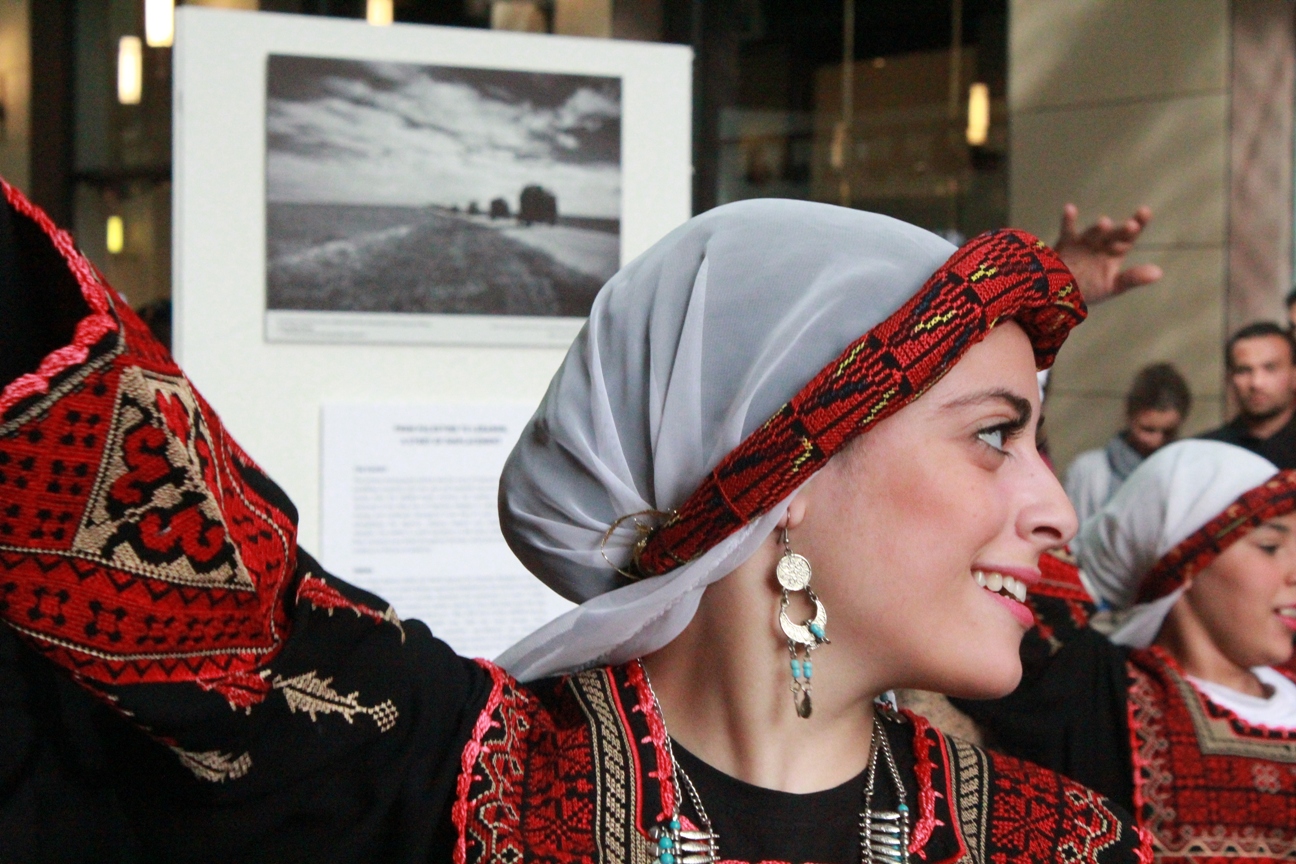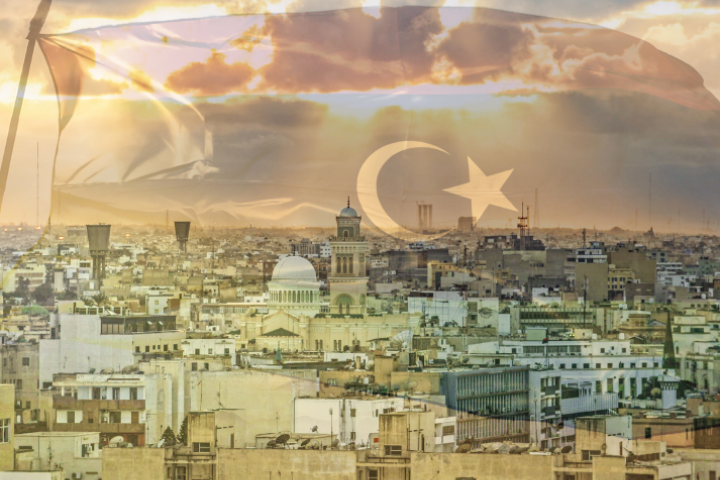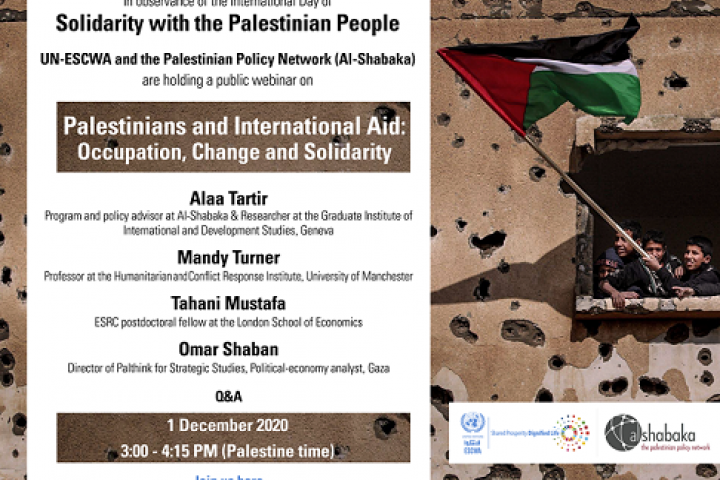Khalaf was addressing a crowd of diplomats, governmental and civil society representatives who had gathered at the UN House to commemorate the International Day of Solidarity with the Palestinian People (29 November), which ESCWA has been making for years.
“The current situation in Palestine is the result of major powers permitting the application of the concept of an ethnically and religiously pure State. Such a concept flies in the face of the principle of equality between individuals, and can only be imposed through violence and oppression. Children are sentenced to 12 years in prison for throwing stones, and 850,000 Palestinians have been detained since the occupation of Gaza and the West Bank. Many are killed simply because they are Palestinians who refuse to forgo their rights and succumb to injustice.” Khalaf said.
She added: “Protracted injustice results in one of two outcomes. The oppressed can either accept it as their fate and surrender, or they can confront it until it is overcome. The Palestinian people has shown over the years that it will not accommodate injustice; rather they have chosen to resist it. They steadfastly refuse to have their rights usurped, or to be shut out from their own land and history. An unwavering conviction resides within them that they will emerge victorious.”
The Executive Secretary also noted: “The world is changing rapidly. Increasingly, people are refusing to limit themselves to verbal support. Numerous supporters stand in solidarity with the Palestinian people in their struggle: campaigns boycotting the occupying regime and its institutions are expanding and gaining strength. Celebrities are not only refusing to take part in this crime, but are determined to expose it. Professionals, like Doctor Mads Gilbert, who joins us today to mark this occasion, are employing their expertise in the service of justice and in support of the Palestinian people’s struggle for their legitimate rights. Arab peoples react with indignation to any hint of normalizing relationships with the Israeli occupying regime. To all of them, to all the people of conscience in the region and throughout the world, I say: your endeavours shall not be in vain.”
In addition to the statement by Khalaf, this year’s commemoration featured a musical performance by the Palestinian heritage band Al-Manfeyen (the exiled ones), with the lead singer Doha Nawf, followed by the message of the United Nations Secretary-General delivered by UN Special Coordinator for Lebanon Sigrid Kaag; the official statements of Lebanon delivered by President of the Lebanese-Palestinian Dialogue Committee (LPDC) Hassan Mneimneh, and of Palestine delivered by Palestinian Minister of National Economy Abeer Odeh. The official ceremony closed with the statement by guest speaker, Norwegian physician and human rights activist Mads Gilbert.
Ban Ki-moon
In his message for the day, United Nations Secretary-General Ban Ki-moon said: “(…)Recent years have witnessed two unsuccessful attempts at negotiating a peaceful settlement, three armed conflicts, thousands of dead – the vast majority of them Palestinian civilians – rampant incitement, terror attacks, thousands of rockets and bombs fired at Israel from Gaza, and an expanding, illegal Israeli settlement enterprise that risks undermining Israel’s democratic values and the character of its society. This year, the number of demolitions of Palestinian houses and other structures by Israeli forces has doubled, compared to 2015. Gaza remains a humanitarian emergency, with 2 million Palestinians struggling with crumbling infrastructure and a paralyzed economy, and tens of thousands still displaced, awaiting reconstruction of homes destroyed by conflict.”
“All this has led to growing anger and frustration among Palestinians and profound disillusionment among Israelis. It has strengthened radicals and weakened moderates on both sides. Making matters worse is a dangerous vacuum within the international community as crises elsewhere claim the attention of world leaders. The internal divisions and in-fighting in the West Bank add a new worrying dimension to the paralyzing lack of Palestinian unity, and undermine democracy and the rule of law. With the Israeli occupation approaching its 50th year, and the prospects for a two-State solution threatening to slip out of reach, the international community must make it clear that it remains committed to helping the parties to rebuild trust and create the conditions for meaningful negotiations,” he added.
Mneymneh
In his speech, Lebanese-Palestinian Dialogue Committee (LPDC) Chairman Hassan Mneymneh said: “We, at LPDC, have been working for a decade to plant the seeds of the dialogue culture in the Lebanese-Palestinian relations. We believe that it is the only way to rebuild fraternal bridges and trust after the flagrant costs that we incurred during the years of wars and crises. Lebanon holds on to what it has already reiterated that the predicament of the Palestinian refugees in Lebanon can only be resolved with the cessation of the Israeli occupation, the implementation of the Right of Return, and the establishment of the Palestinian State on the Palestinian territories occupied since 1967. The Lebanese and Palestinian stances have intersected to insist on this right, while rejecting settlement or naturalisation or any other form of annihilation to the Palestinian national identity. Until then, the different Lebanese Cabinets have devoted more than ten years ago the predisposition to grant Palestinians their human and social rights."
He added: "We, at LPDC, have prepared several recommendations that were reached upon consultation with the key Lebanese parties that have been in the Parliament and the successive cabinets. We have endeavoured to affirm that the Palestinian presence must fall under the Lebanese sovereignty with a pledge to grant it its natural rights. Accordingly, I stress before you that the security incidents that have been witnessed in Ein al-Helweh refugee camp cannot be addressed by erecting a security wall between the camp and its surroundings, and, while we condemn the concept and idea of such a wall, prior experiences have shown that it cannot address any political or social issues. Security in the camp and Sidon can only be achieved through sustainable development and by resolving decades-long predicaments which are aggravated further by the reduction of donors’ funds to UNRWA that are devoted to healthcare, education, and other basic living needs. Unlike what is being said, as a dialogue committee, we can see that such a wall would offer a free favour to the takfiri groups that live on despair, violating human rights, imposing checkpoints, prohibiting construction materials, and forcing isolating zones, while ignoring the clear fact that the camp is not a security zone, because it is a residential area comprised of around eighty thousand suffering refugees, and in need for a an integral and urgent solution.”
Odeh
For her part, Palestinian Minister of Economy Abi Odeh said that occupation authorities are currently working on “diverting the conflict from the political to the religious spheres. Jerusalem is now facing an alarming escalation through continuous attacks and incitement by Israeli extremists against both Christian and Islamic religious sites. A new reality is being imposed through the spacial and temporal partition of the Holy Aqsa Mosque and the Temple Mount, as the characteristics of the city, its historic spirit and its population, are being altered, and it is being isolated from its Arab Palestinian surroundings”.
She added: “Despite Security Council resolutions that condemned settlement construction, deeming them illegal, and called for the dismantling all such settlements as they breach the Fourth Geneva Convention and other international law principles and foundations. And despite their call for the immediate cessation of occupation authority practices of changing the demographic structure of occupied East Jerusalem, and the international community’s condemnation of Israeli practices, no effective measures have been undertaken until now to hold Israel accountable for its actions.”
“Our Palestinian people is still armed with hope, having bravely chosen the path of peace, holding onto a deeply-rooted faith in pursuing political, diplomatic and legal efforts to reach a just and comprehensive peace that answers the rightful national expectations of our people to live in freedom and dignity in its independent State. Therefore, work must be done to salvage the chances of achieving peace and efforts much be exerted to ensure the international participation for the achievement of peace, including working with our French friends to support their initiative in holding a peace conference before year’s end, which would conclude with clear criteria for achieving peace in accordance to a two-state solution based on the 1967 borders, and to relevant UN resolutions, Madrid principles, the Arab peace initiative and the roadmap plan, with a timeframe for the end of the occupation.”
Gilbert
In his statement, guest speaker, Norwegian physician Mads Gilbert said: “We should turn our attention to the brave long-standing resistance of the Palestinian people,” noting that “The Palestinian people must have the same as we have: equal rights to self-determination and the opportunity for all to pursue economic well-being and social development.”
“I am not a hero. I dedicate this talk to the real heroes, the people of Gaza and their medical staff; they are the real heroes defending humanity, never giving up, never escaping,” Dr. Gilbert added.
Giving examples of his work in 1982 Beirut and 2014 Gaza. “"In besieged west Beirut in 1982, I met "Khalil" whose mom was killed and whose arm was amputated. The following week his hospital was bombed. But he had regained color in the cheeks and was insisting on dressing his own wounds; he would sing Palestinian songs… For me, he became a teaching experience and a symbol of Palestinian dignity, resilience, and steadfastness, but most importantly of respect. Between this balance between pity and respect, solidarity not only looks for suffering and pain, but also for the resilience,” he said.
Quoting late President of Mozambique Samora Machel, Dr Gilbert said: “Solidarity is not an act of charity. It's an act of unity between allies fighting on different terrains toward the same objectives.”
"Israeli impunity is the biggest moral challenge of our times,” Dr Gilbert concluded, and asked “How can we contribute to justice in Palestine? We should learn resilience and resistance from the Palestinians. Moreover, Boycott-Divestment-Sanctions (BDS) is urgently needed. We can learn from Iceland which had declared boycott of all Israeli goods in 2015. In Norway we picked the challenge from Iceland to boycott Israeli goods made on Palestinian land and occupied territory.”
Participants in the ceremony then moved to Beirut Souks, where they inaugurated a cultural exhibit on “Palestinian Moments”. The exhibit was organized in cooperation with the United Nations Relief and Works Agency for Palestine Refugees in the Near East (UNRWA) and LPDC.
It featured five components:
- “The Long Journey” a photo exhibit by UNRWA;
- “Moments of Awareness” infographs by Visualizing Palestine;
- “Lives under Siege” photos from Gaza provided by The Union of Arab Photographers;
- “Inspired Moments” installations by Abdul Rahman Katanani;
- “Embroidered Moments” handicrafts by Palestinian refugees in Lebanon.
On Wednesday 30 November, a talk on the “Endless Wounds of Gaza” was held at the American University of Beirut (AUB), with the participation of Dr. Mads Gilbert and Dr. Ghassan Abu Sitta, who have provided medical care in Gaza, to discuss life and health conditions in the Strip. The discussion was organised by ESCWA, the Conflict Medicine Program at AUB, and the AUB Palestinian Cultural Club (PCC).



